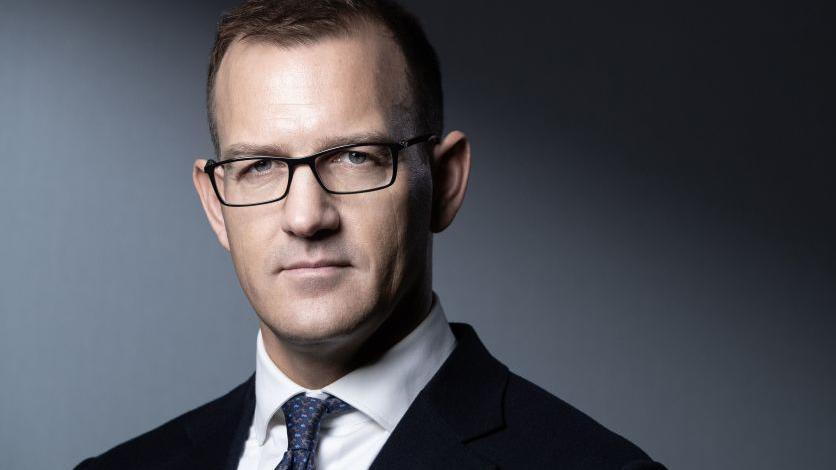Royal Mail bid faces probe on potential Russia links

Daniel Kretinsky made his money in energy in Central and Eastern Europe
- Published
Royal Mail's takeover by Czech billionaire Daniel Kretinsky will face a government probe, including into potential links with Russia, the BBC understands.
Officials have "called in" the purchase of the postal service's parent company for an investigation under the National Security and Investment Act.
The bid will be suspended, a routine process anytime the government reviews a takeover, but it does not mean that Mr Kretinsky has withdrawn from the deal.
The government could block the deal, though a similar review when Mr Kretinsky increased his stake in Royal Mail found nothing. Mr Kretinsky declined to comment.
However, the BBC understands this probe will be more thorough than last time because Mr Kretinsky is trying to buy the whole parent company in a £5bn deal, including assumed debts, as opposed to a stake.
Mr Kretinsky's companies own a gas transmission business called EUStream that carries Russian gas into Europe but with the knowledge and permission of the European Union (EU).
It is a transmission business only and none of Mr Kretinsky's companies buy or trade in Russian gas.
As well as links to Russia, officials will look at whether the UK could be hurt by the private purchase of a postal service that has been delivering mail since it was founded by Henry VIII.
People close to the deal told the BBC that talks between Mr Kretinksy's team, Business Secretary Jonathan Reynolds and government advisers are "ongoing and have been constructive".
The probe could take up to two months, although government officials said they hoped they could make a decision sooner.
Mr Reynolds recently held direct talks with Mr Kretinsky and previously indicated an investigation was likely.
The process will be run by the Cabinet Office with input from the Department for Business and Trade.
Royal Mail will deliver letters forever, vows buyer
- Published16 July 2024
Royal Mail owners agree to £5bn takeover offer
- Published29 May 2024
Reacting to the news, the Communication Workers Union, which represents postal workers, said it wants the government to "robustly scrutinise the detail of this takeover offer".
"The contractual obligations negotiated between the failed current Royal Mail board and Mr Kretinsky are not strong enough to protect workers, customers and the crucial infrastructure that Royal Mail provides for our communities and the economy," it said.
It also suggested it was time for a new business model "which gives workers a greater say".
Mr Kretinsky, however, has said he would never walk away from Royal Mail's commitment to deliver letters throughout the UK six days a week.
He has committed in writing to honouring the Universal Service Obligation (USO), but only for five years.
However, in an interview with the BBC earlier this month, he said: "Royal Mail is going to be the provider of USO in the UK, I would say forever, as long as the service is going to be needed, and as long as we are going to be around."
He added that he "completely excluded" walking away from the USO "as long as I'm alive".
He also said he is "very open" to profit sharing, but he is not in favour of the shared ownership the union are pushing for.
"I don't think the ownership stake is the right model," he said. "The logic is: share of profit, yes, [but an] ownership structure creates a lot of complexity.
"For instance, what happens if the employee leaves? He has shares, he is leaving, he is not working for the company, he [still] needs remunerating."
Mr Kretinsky has also guaranteed no compulsory redundancies or changes in terms and conditions but only until 2025.